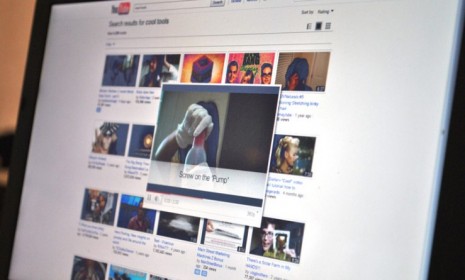Google's controversial plan to fight piracy — except on YouTube
The tech giant wants to curb the sharing of illegal content online by burying infringing sites in its search rankings, but leaving piracy-riddled YouTube alone

A free daily email with the biggest news stories of the day – and the best features from TheWeek.com
You are now subscribed
Your newsletter sign-up was successful
Pretty soon it's going to be a lot harder to find pirated material using Google. The search giant says it's cracking down on piracy by instituting a new policy that lowers the search rankings of websites hosting illegal content, meaning many peoples' beloved torrent sites — where you can download all matter of pirated content — will be buried many pages in Google results. There is a slight hitch, however: Google owns Youtube, one of the internet's largest receptacles of illegal content, and the video site seems to be exempt from the search company's crackdown. What gives? Here, a brief guide to the controversial new policy:
What is Google doing exactly?
On its search results pages, Google will bump down sites from which it receives a lot of "valid copyright removal notices." People can flag offending websites by visiting a page labeled "Removing Content From Google," says Edward Moyer at CNET. The more of these notices a given website receives, the lower its search rankings will be. Basically, Google is algorithmically punishing sites like TorrentHound and PirateBay, so that users searching for something like "Transformers 3 torrent" will have a much harder time getting to what they're looking for, such as an illegal download, at least while using search.
The Week
Escape your echo chamber. Get the facts behind the news, plus analysis from multiple perspectives.

Sign up for The Week's Free Newsletters
From our morning news briefing to a weekly Good News Newsletter, get the best of The Week delivered directly to your inbox.
From our morning news briefing to a weekly Good News Newsletter, get the best of The Week delivered directly to your inbox.
How is YouTube exempted?
As Danny Sullivan at Search Engine Land notes, removing illicit content on YouTube requires a user to visit the streaming video site's "Copyright Center" instead, which systematically exempts YouTube from Google's ranking penalties. In doing this, Google could simply be "rewarding YouTube for having such a proactive, easy to use, built-in takedown system," says Eric Limer at Gizmodo. Or Google could be playing favorites with one of its most popular web properties.
What does Google say about the favoritism?
Google says it isn't giving YouTube any special treatment, and the penalty exemption won't affect a number of other popular destinations, including Facebook, IMDB, Tumblr, and Twitter — where illegally hosted pictures and videos often spread. Google says it will look at a number of factors to determine if a site seems legit, says Sullivan. One possible factor could be the number of reputable sites linking to it. In this way, the new policy might not have "a YouTube–specific clause, but YouTube will escape along with other sites." Either way, Google didn't make that clear in its initial announcement, "which suggested the penalty was purely tied to the number of [removal] notices acted upon."
A free daily email with the biggest news stories of the day – and the best features from TheWeek.com
What does this mean for me?
It will still be possible to find pirated material on user-generated content sites "through recommendations and serendipity," says Anthony Wing Kosner at Forbes, but users will have a "harder time discovering that content through search." In theory, these will redirect "the less hardcore file-sharers" to more legitimate content sites, like Hulu or Google Play.
Sources: CNET, Gizmodo, Forbes, Search Engine Land


